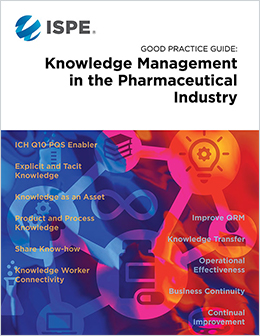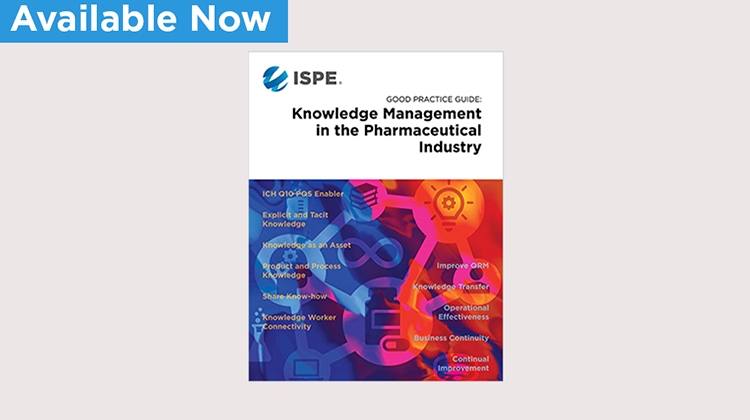Employing knowledge management methods and tools enables organizations to better manage their knowledge as key asset, in turn improving the effectiveness of the pharmaceutical quality system, providing operational benefits. Some examples of benefits of when knowledge is managed as an asset include taking the waste out of time to find knowledge, better decision making, better utilization of tacit knowledge, and improving Right First Time (RFT) expectations.
 The ISPE Good Practice Guide: Knowledge Management in the Pharmaceutical Industry is the first industry guidance to address the role of Knowledge Management specifically for the pharmaceutical industry. This guide works to demystify knowledge management and provides practical guidance, templates, case studies, and references to related ISPE industry guidance (e.g. technology transfer) to help organizations better understand what knowledge management is, the benefits of effective knowledge management, and how to deploy knowledge management.
The ISPE Good Practice Guide: Knowledge Management in the Pharmaceutical Industry is the first industry guidance to address the role of Knowledge Management specifically for the pharmaceutical industry. This guide works to demystify knowledge management and provides practical guidance, templates, case studies, and references to related ISPE industry guidance (e.g. technology transfer) to help organizations better understand what knowledge management is, the benefits of effective knowledge management, and how to deploy knowledge management.
An important theme throughout this Guide is the emphasis on tacit knowledge. Given the regulated and document-centric nature of the pharmaceutical industry, the importance and impact of tacit knowledge is arguably underappreciated. This Guide aims to highlight this, and where appropriate, provide knowledge management methods and tools to better recognize, capture, transfer, and apply tacit knowledge.
Other key takeaways include:
- Emphasis on Technology Transfer, including references to the ISPE Good Practice Guide: Technology Transfer
- Linkages to ISPE PQLI Guides
- Exploring the relationship between knowledge management and QRM
- Relating this Guide to the ISO standard for knowledge management, ISO 30401
- The importance of Organizational Change Management
- A collection of knowledge management methods and tools
The Guide seeks to embrace and advance the topic of knowledge management for the pharmaceutical industry.
The goals of the Guide are to:
- Define and explore the meaning and importance of knowledge management in the context of the pharmaceutical industry
- Discuss the importance of knowledge management to the PQS (Pharmaceutical Quality System)
- Describe knowledge management principles, key concepts, the general knowledge management process, and foundational knowledge management methods and tools
- Discuss forward looking opportunities for knowledge management
- Share practical pharmaceutical applications and case studies of knowledge management
The practical principles, methods, and tools provided in the Guide are intended to help organizations improve their capabilities in managing knowledge and using that knowledge to support an effective PQS resulting in improved PQS outcomes (e.g., better risk-based decision making) and operational performance, among other benefits.
ISPE will host a free webinar about the ISPE Good Practice Guide: Knowledge Management in the Pharmaceutical Industry on 26 January 2022, 1100-1230 PM ET. Lead by members of the Guide authoring team, the webinar will provide a deeper dive into the Guide including:
- A definition and exploration of the meaning of knowledge management in the context of the pharma industry
- A discussion of the importance of KM to the PQS
- A description of knowledge management principles, key concepts, general knowledge management process and fundamental methods and tools with supporting case studies
Presenters for the Webinar
Paige E. Kane, CPIP, is a Director in the Merck Manufacturing Division, and a member of the MMD Knowledge Management (KM) Center of Excellence. She is an industry leader with over 30 years of experience, including with six pharmaceutical companies and the US government, spending the past 13 years designing and leading KM programs and approaches for the Pharmaceutical Industry. Prior to her work in KM, Kane led multiple quality systems groups focusing on automation compliance strategies, change control, document management, computer/equipment validation and data integrity for new biotechnology facility start-ups and operations in the US and Ireland. She has experience working across the pharmaceutical product lifecycle in GLP, GCP (clinical trial oversight and supplies), and GMP in human and animal health.
Kane has led several industry strategic teams including ISPE CoPs, and was co-lead of the ISPE KM Good Practice Guide authoring team. Paige has participated in authoring several industry guidance documents and contributed to many conference sessions and industry papers. She is a co-editor of, and multi-chapter contributor to, ‘A Lifecycle Approach to Knowledge Excellence in the Biopharmaceutical Industry’ (2018).
Melanie Jane Adams is an Associate Director in the MSD (Merck & Co., Inc. Carlow, Ireland) MMD Knowledge Management (KM) Center of Excellence. She is an industry leader with over 16 years of experience; including SOD Manufacturing Operations, Quality Control, Technical Transfer and the deployment of KM strategies in SOD and Bio-Pharma Sites in Wyeth and Pfizer Pharmaceutical Organizations. Adams was also a member of the ISPE KM Good Practice Guide Team, leveraging her practical experience deploying KM within industry when writing the guide.
Stephanie Friedrichsen joined Eli Lilly & Company in 2008 as part of PR&D’s Clinical Trial QA group, where she was the process owner for collaboration partner qualification, ongoing oversight, and activities such as person in plant and metrics. In 2015, she transitioned to the Global Serialization Program where she is responsible for the strategic plan for knowledge management, training strategy, and lean six sigma projects and applications within Global Packaging & Robotics. Friedrichsen has previously spoken at APQC’s KM Conference on the application of KM to Lilly’s serialization project and at IFPAC on behalf of the BPOG KM workstream. In 2021, She was the IFPAC KM session co-chair and a member of the ISPE KM Good Practice Guide author team.
Register now!








